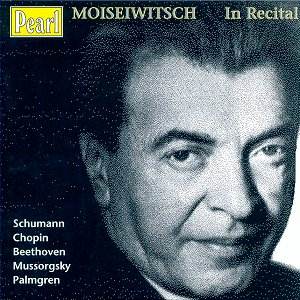Until recently very few of Moiseiwitsch’s live recitals
were thought to have survived. The BBC has disinterred some Concerto
performances – it would be good if they were to issue a cleaned up Delius
Concerto – but Moiseiwitsch the recitalist remains relatively obscure.
Two issues, however, are now worthy of the highest interest. Arbiter
120 releases recital recordings from 1954-60 – plenty of Chopin, Stravinsky’s
Etude Op 7 No 4, long a favourite of his, some Bach-Liszt, Schubert-Liszt
and a Wagner-Liszt Tannhauser traversal which usefully complements the
pianist’s magnificent HMV recording of 1938. On this Pearl double CD
set – a remarkable series of survivals from the latter part of his life
– we have even more. As the notes explain these were made on reel-to-reel
tape with a professional recording set up. The tapes Pearl has used
are dubbings because the original tapes were then re-used. Inevitably
we can hear some instabilities, flutter, wow and attendant problems
inherent in the recording method – but otherwise the sound is lifelike
and nothing impairs enjoyment. The tapes reside at the University of
Austin, Texas and are dated from January to February 1961. There are
at least four separate recitals here or parts of recitals. No locations
are noted in Pearl’s documentation – presumably American college and
recital halls.
As with the Stravinsky Etude so with the Mussoursgky
- more duplication of earlier discographic triumphs though it would
be idle to pretend that this is the impregnable giant of old. He had
never recorded the Chopin Sonata in B minor and of Schumann’s Carnaval
his 1919 HMV recording was unissued and he was never asked to record
a note of the Etudes Symphoniques or Kreisleriana. The Schumann performances
are the cornerstone of the collection; he was avowedly Moiseiwitsch’s
favourite composer and the pianist often spoke movingly of him, so it
is good to hear these recitals. His playing is more obviously vigorous
and tempo-straining here, rather splashy and occasionally approximate
than in his younger years – somewhat inevitably – but it’s still a moving
document. The abrasive and impulsive Chopin Etudes are consistently
reminiscent of his 1925 records – listening to the Op 10 No 4 C sharp
minor Etude, for example, is to listen to a broadly unchanged conception,
fleet, pearl toned, but also to note the rather muddied inner voicings
and a fistful of wrong notes in 1961.
Nevertheless this is a distinguished release and it
can fairly be said that no lover of so-called Golden Age pianism can
afford to be without it.
Jonathan Woolf


